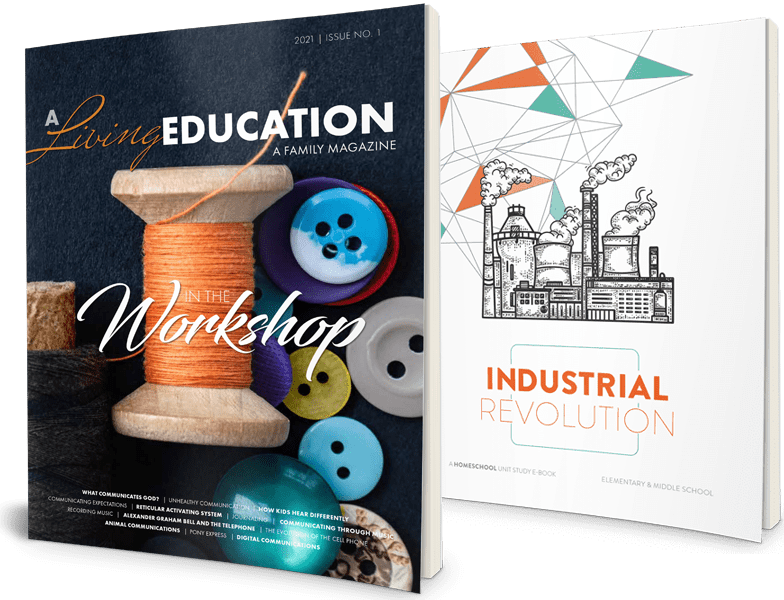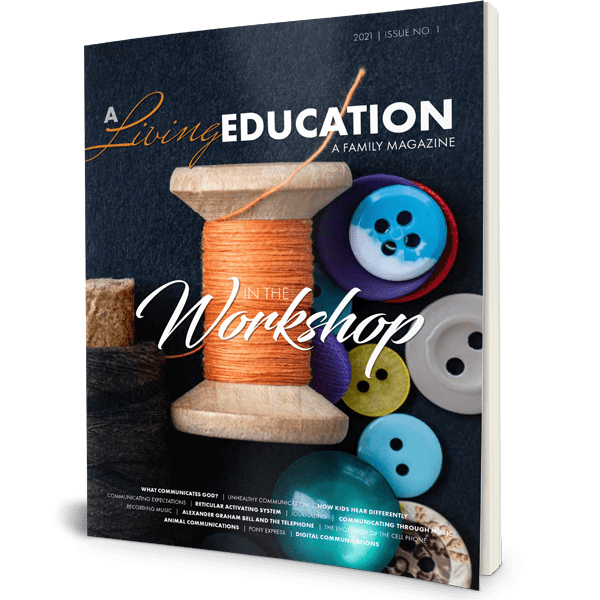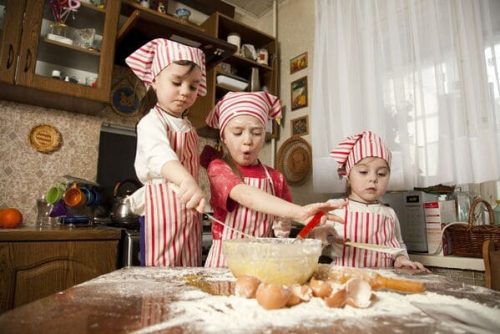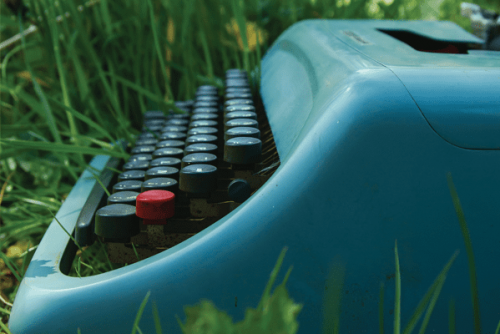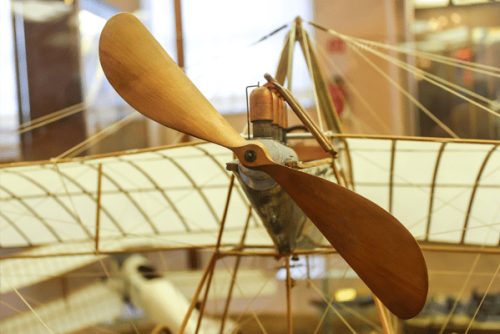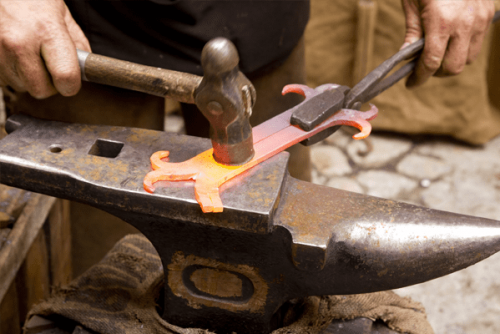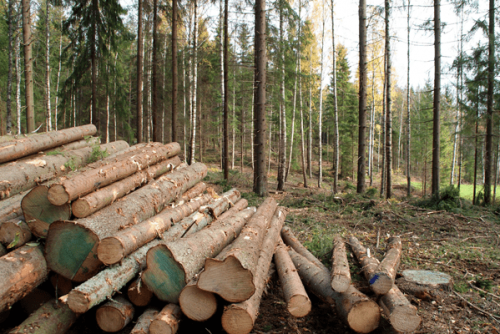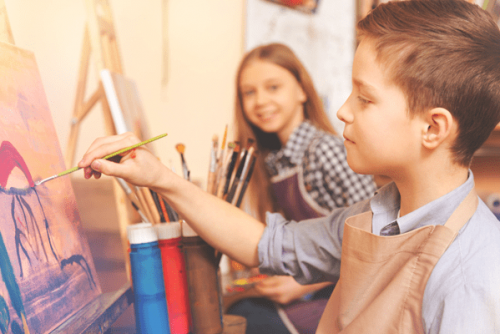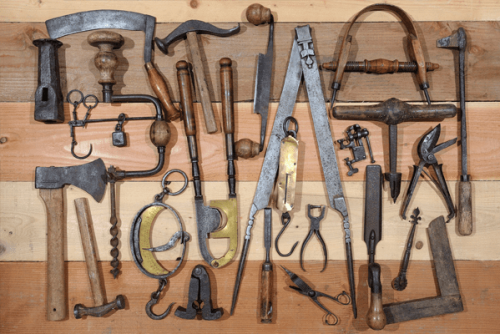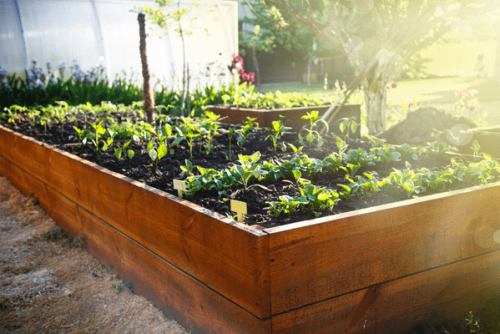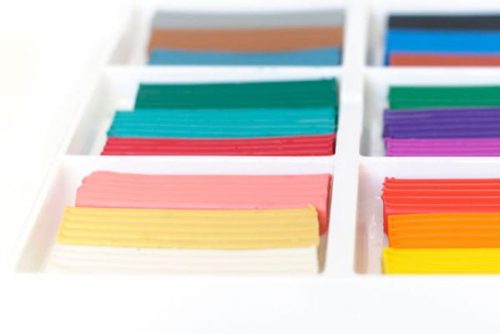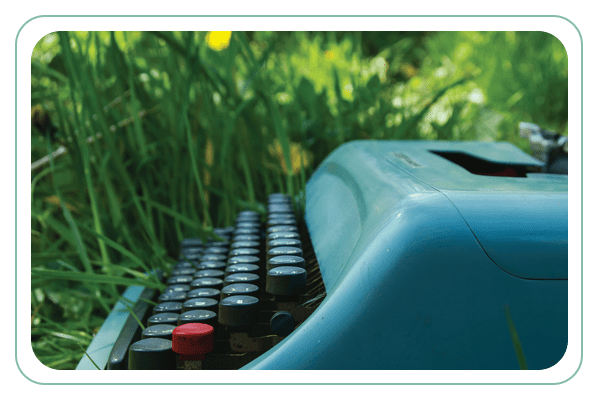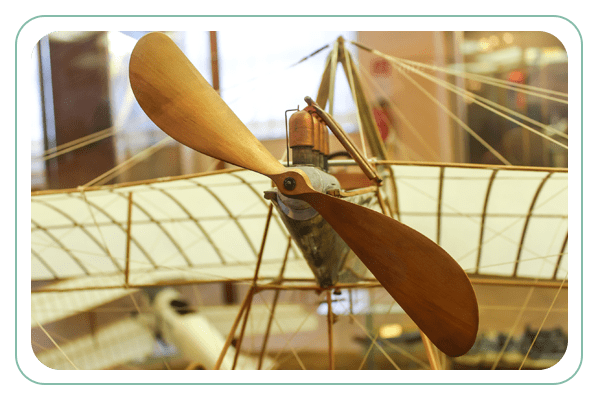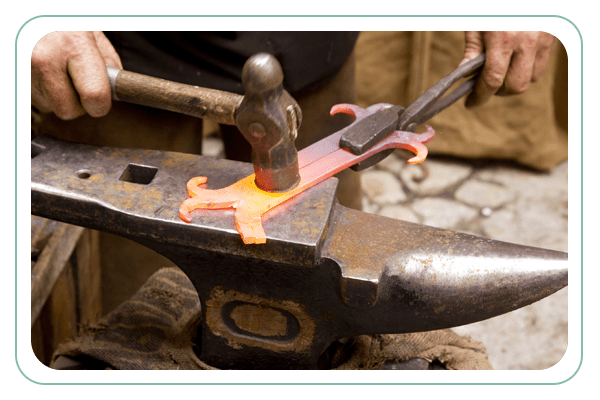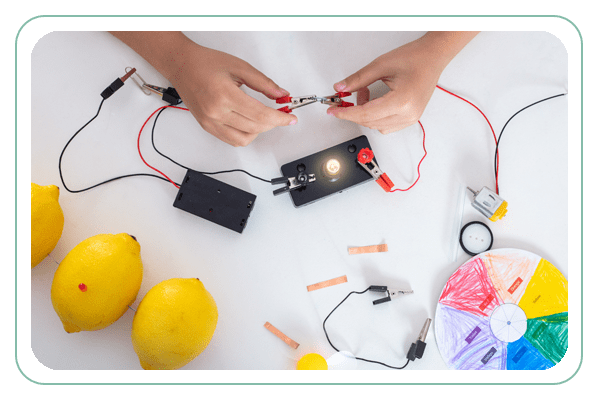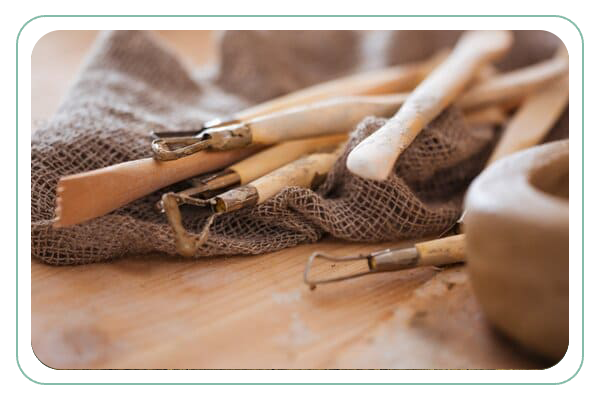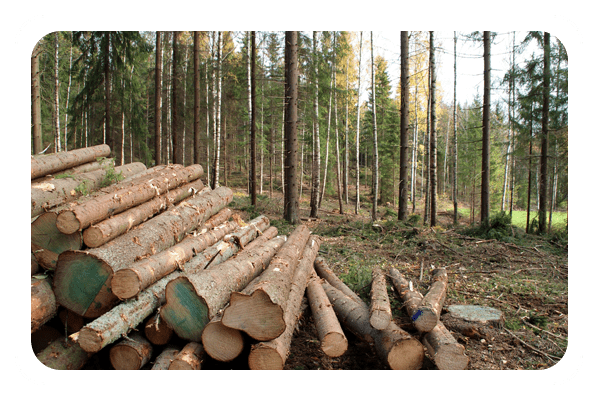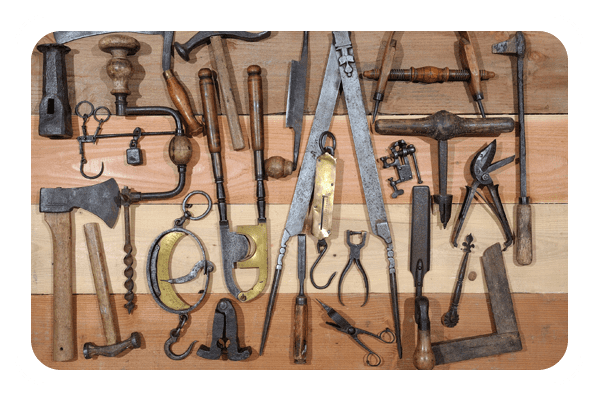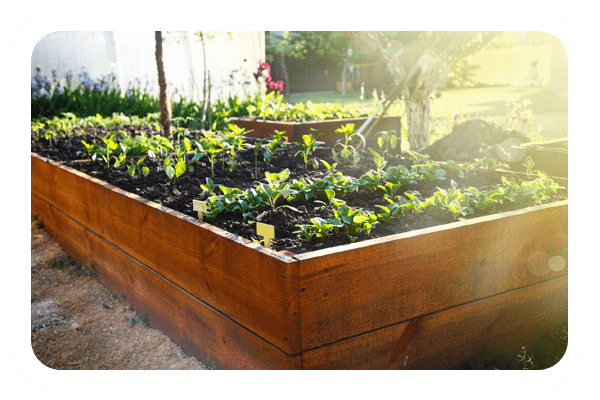Workshops are places of creativity and invention, and when children learn all of the exciting things that have come out of the workshops of history, their own creativity is nourished! In this issue, the In the Workshop collection will look at how the workshop theme ties to homeschool planning, faith, parenting, and marriage.
We’ll also explore inventions and ideas that have come out of workshops throughout history, including an in-depth Unit Study on how the Industrial Revolution impacted and changed the way work was done. And, what’s learning without hands-on activities? There are plenty of those in this collection as well!

In the Workshop Collection Sponsor
Explore Homeschooling
Professional development is a key component of any career. Homeschooling is no exception! At Explore Homeschooling, you’ll find teacher training, downloadable resources, and monthly curriculum resources to help strengthen your skills as a homeschool teacher. Take advantage of free membership and get started on your homeschool teacher professional development journey!
Table of Contents
In the Workshop Collection
In the Workshop Collection
Bonus Articles, Podcasts, and More
Explore In the Workshop Collection

Editor’s Note
God’s Workshop
In the beginning God created…
I have read those first five words time and time again, rarely stopping to think through their implications. God is a creator, inventor, designer, architect, artist, and more. When we think of other creators or artists, such as Leonardo Di Vinci, we ask questions about how they created. What purpose and what potential does each creation have? Why not ask the same questions about our own design?
The belief is that God created each of us in His own image. I can take our natural tendencies and understand those are also the tendencies of God. For example, I’m a parent and have procreated children. In such, I can draw an understanding of God from my experience as a parent and circle back around to gain more insight into being His child.
Faith
The Cat’s Out of the Bag
The Journey of Deconstrustion
There’s a new word I’m seeing popup on social media and in conversations. Perhaps you’ve heard it: deconstruction. When I first heard this word, I immediately thought of Tonka trucks and steel cranes. Perhaps that because I have two boys. But that isn’t what this word is about. Well, not exactly.
Deconstruction is a word often used when describing a religious journey, most frequently within Christianity. Depending on your experience, you may cringe at the word or you may smile with relief. So why is it that this word has people who claim the same faith standing on polar opposite sides of interpretation? Let me explain.
Marriage
Inventing Your Own Marriage
Embracing Your Own Personalities
I have a friend who regularly asks about my current favorite marriage book, especially for ministry purposes. But, that question always hits up against a conflicting reality. You see, I don’t particularly like most marriage books.
My husband and I have been married for over two decades, and we’ve both been in ministry for longer than that. We’ve seen marriages. We’ve seen the good, the bad, and the downright ugly.
Parenting
Let The Mess Happen
Allowing Kids to Develop!
The other day, I realized that I have just over a year before my homeschooling journey comes to an end. Being this near the end makes me retrospective, and I was thinking of the early years of homeschooling when I had two kids four years apart that I was schooling and my two preschool-aged nephews that I babysat added to the mix. What a lot of noise and energy and MESS was strewn through our house at that time!
With only a high-school junior homeschooling part-time, things are a lot calmer now. But, I find myself missing the noise and even the mess of those days. And while I have learned a lot about being organized over the years…
Featured Homeschooling Article
A Homeschool Teacher’s Check-In
Ensuring Your Student’s Your Best
In 2020, we all experienced an upheaval of everyday life, globally impacting every person with anxiety and concern about the future. Stresses mounted as we worried about our health, paychecks, and toilet paper supplies. The devastation was worldwide, and the effects, well, they are yet to be determined. But there is one area that has gained much more awareness and respect: mental health.
Having a daughter and son-in-law finishing up their undergrad in psychology and heading off to grad school, coupled with recent conversations with professionals in the mental health industry, it seems the once taboo subject, especially in conservative Christian circles, is now gaining attention. Instead of throwing out a scripture verse that bypassed an understanding of the situation while demanding “trust and obey” or “be anxious for nothing,” those in Christianity are finally realizing that simple Bible verse bandaids and empty promises don’t do the trick.
Planning & Organizing
How to Plan Projects
Maximizing Your Schedule
Planning when you have a book that’s divided up into lessons or chapters is pretty straightforward. Planning for school projects is a little trickier, but it’s definitely less stressful when you put a little planning time into it at the start. How much planning you, as the teacher, need to do will depend partly on the age and independence level of your student.
Here’s a basic breakdown of how to effectively guide your student through planning a project:
Teaching Beyond the Books
Writer’s Workshop
Facilitating Possibilities
Writer’s workshop is a student-centered method of teaching writing. The idea behind this method is that students will learn to write best when they write frequently about topics they choose. This is more of a coaching or facilitating approach to writing than direct writing instruction. It is also meant to encourage students that they can be “real” writers. This method is popular in traditional classrooms, but it meshes well with homeschool approaches to education. While writer’s workshop procedures vary somewhat from teacher to teacher, there are several steps and characteristics that will show up in all writer’s workshops.
Ask A Homeschool Mom
How Have You Helped Your Students Find Their Creative Niche?

Rebecca Farris, Mom of 5
20 Years of Homeschooling
Observation, observation, observation. When the kids were little, watching them play and providing an assortment of toys and games is where I began to notice what interested each child. As they grew, I tried to provide…

Ann Hibbard, Mom of 3
15 Years of Homeschooling
As we’ve tried to watch and equip our kids’ interests, some things have fallen flat while others have taken off. But, our number one goal has been to try to avoid limiting their interests to only what will result in a good…

Stephenie McBride, Mom of 2
18 Years of Homeschooling
In our home, we believe in exposing our children to as many different creative opportunities as possible in order to help them find what they enjoy and excel at. We have taken them to plays, concerts…

Teisha Priest, Mom of 4
13 Years of Homeschooling
Mostly, I’ve watched to see what sparks the interest of any of my kids and then tried to give them the chance to explore that interest. Sometimes I’ve suggested something to one of my kids that I thought …
Nature Study
Every walk should offer some knotty problem for the children to think out, ‘Why does that leaf float on the water, and this pebble sink?’ and so on.
– Charlotte Mason
From Nature to Adventure
The Process of Observation
It’s fun to imagine inventors brainstorming crazy ideas out of thin air and trying to figure out how to make them work. More often than not, though, ideas spring from the process of observation. Perhaps someone observes a problem and wants to try to find a solution. Or maybe experimentation causes a scientist to observe something unexpected, and figuring out what happened leads to a new discovery or invention.
But many times inventors get their ideas from something they observed in nature! Leonardo da Vinci created a wide range of flight-based …
Nature Inspired Discoveries
Inventions From Creation
In the beginning God created the heavens and the earth. -Genesis 1:1
If you go for a walk and look at the beauty and wonder of nature all around you, it’s easy to see the hand of God our Creator. His creation is so amazing that it is the inspiration for many inventors to create items we use everyday. Here are just a few examples of some of the inventions that have been influenced by nature, as well as the part of nature that inspired them.
Living Education
History is for human self-knowledge … the only clue to what man can do is what man has done. The value of history, then, is that it teaches us what man has done and thus what man is. – R. G. Collingwood
Person to Theory
How One Inventor Used the Process
The name Leonardo da Vinci is most famously connected to his art, especially his well-known paintings The Mona Lisa and The Last Supper. But did you know that he was also a brilliant inventor? In fact, we still have detailed drawings of his inventions, including amazing things like a helicopter, a parachute, a tank, a machine gun, a diving suit, and so much more!
So, just how well did Leonardo da Vinci follow the process of inventing?
Ford’s Assembly Line
Efficiency Met Industry
Prior to the adoption of the assembly line in automobile production, a Ford Model T car would take over 12 hours to assemble from start to finish. This may not seem like a long time, but it was long enough to make the Model T unaffordable for most average workers at the time. In order to reduce the cost of the automobile, and in turn sell more of them, Henry Ford knew that he would have to find a more efficient process for manufacturing his cars.
Blacksmithing & Factories
Advancements of the Industrial Revolution
If you lived three hundred years ago and needed a new hammer, you’d go to a blacksmith. You’d also go to the blacksmith if you needed repairs to your wagon wheel rim or farm equipment. Oh, and what if your horse threw a shoe? Yep, you’d go to a blacksmith for that, as well. Taking care of and shoeing horses was such a big…
Hands On Learning
Tell me and I forget, teach me and I may remember, involve me and I learn. – Benjamin Franklin
How Things Work
Choosing Wood
Whether you’re constructing a home, building furniture, or creating a work of art, one of the materials you may need is wood. There are many kinds of wood to choose from, and the kind of wood chosen for a particular project depends on which one has the properties that are best suited to it.
Wood Working Project
Raised Bed Garden
A raised bed garden is an easy way to start a small garden plot in your yard. It’s also an easy DIY project for the aspiring woodworker!
NOTE: The use of tools, particularly power tools, should always be done with the help of a grownup and while using appropriate safety gear like eye protection. Safety first!
In the Kitchen
Children learn as they play. Most importantly, in play, children
learn how to learn. – O.F. Donaldson
Food Engineering
Making Candy
Every time you put a piece of candy in your mouth, you are tasting science! In fact, good candy making involves some pretty complex scientific processes. Even if you don’t understand all of the science behind candy making, it can be helpful to at least know a little bit about what happens to sugar when it is dissolved in a liquid at different temperatures and then is cooled back down.
Food Inventions
Fun Facts About Your Favorite Foods
Most people rarely think about how the foods that we eat came to be. Many treats we enjoy today haven’t always been around. Some were invented by accident and some were invented to serve a purpose, just like inventions such as telephones and dishwashers. Here are six food “inventions” with interesting stories.
Fun Inventions Timeline
From the 19th & 20th Centuries
Battery Invented
Battery Invented
Discovery of Matches
Discovery of Matches
The Mechanical Dishwasher
The Mechanical Dishwasher
The Windshield Wiper
The Windshield Wiper
Take a look around you and pick a dozen things that you use every day without thinking about it. Now imagine what life would be like if no one had thought to invent those items! Even the paper and ink for the magazine you’re holding had to be invented. We owe so much to creative and brilliant inventors throughout history. Here are just a few inventors and their fun inventions from the last couple hundred years.

Editor’s Note
Summer School of Fun
Adding fun to learning
Hasn’t this been an extraordinary issue? The topic of workshops for the creator and inventor covers such a variety of topics. But, you may also finish this issue and wonder, “How in the world do I add this to my homeschooling?!”
Don’t fret. The themes in this issue are to help bring to light new possibilities and also generate new ideas for your students. But I also understand that covering the four core subjects of math, science, history, and language arts…
Industrial Revolution
Unit Study Download
When we think about a workshop these days, what often comes to mind is that shed or small building behind the house filled with wood, tools, and hobbies — or perhaps the workplace of an artisan. But once upon a time the one-man workshop was the center of industry! The arrival of the Industrial Revolution changed all of that, paving the way for mass production and factories. Learn more about this major shift in history and its impact on our world when you dive into this Industrial Revolution unit study.

